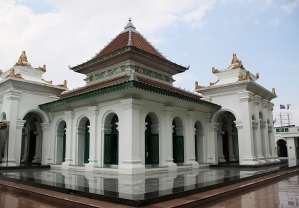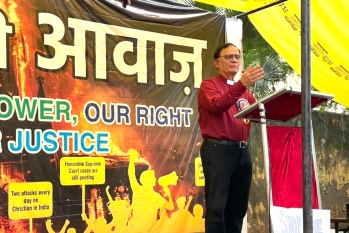
Hundreds of Muslims on Sumatra Island, Indonesia on Oct. 14 protested against construction of a church building based on the area being predominantly Muslim, according to various sources.
The protestors in Palembang, capital of South Sumatra Province, also claimed that the land for the proposed church site belongs to the government and that there were no permanent Christian residents in the area.
Besides area residents, opposition to construction of the Huria Kristen Batak Protestant (HKBP) Church on Pangeran Ratu Street, Blok B8, No.15, in Jakabaring Sub-District, included Muslims of three Palembang sub-districts such as community leaders and Indonesian Ulema Council (Majelis Ulama Indonesia, MUI] officials, opponents said. The three sub-districts are Jakabaring, Kertapati and Seberang Ulu I.
The head of the Rejection Movement to HKBP Church Construction, H. Badaruddin, stated that before the protest his group held a meeting to raise residents’ voices to oppose the construction, according to news outlet Disway.id.
“The residents in that area are all Muslims,” Badaruddin reportedly said. “We certainly have no problem if Christians are living there now.”
Badaruddin also told local television station PalTV that they would mount a large-scale demonstration “to cancel the construction” if the government ignored their opposition.
Dely Ibrahim, head of the Seberang Ulu I Subdistrict Chapter of the Indonesian Ulema Council, along with three others, said the underlying motive for rejecting construction was that the majority of the area population was Muslim.
“We hope the church’s construction won’t be imposed on us, as the majority of the population is Muslim,” he said. “We, representing the clerics from the Jakabaring, Kertapati and Sebrang Ulu I sub-districts, oppose the construction of the church.”
Badaruddin, however, said that his party had not yet coordinated his protest with the sub-district head, according to palpres.bacakoran.co.
“The sub-district head is always evasive, as if afraid of something being exposed or something else being discovered,” he said.
Palembang Mayor Ratu Dewa said he was still awaiting a comprehensive report on the issue and appealed to the community to maintain peace, PalTV reported.
“I’m still waiting for the report, because the administrative process must be completed at the grassroots level, both with the local community and with the Interfaith Harmony Forum,” Ratu said. “This process has not yet reached the mayoral level. I will look into the matter and discuss it with the regional secretary, the assistant for public welfare and the local sub-district head.”
The coordinator of the protest, identified only as Heri, alleged that residents who granted approval of the church construction permit had been bribed with goods and money, according to palpres.bacakoran.co.
“Certain individuals have done it to obtain residents’ signatures for the HKBP church construction,” Heri reportedly said. “They were asked to sign without any clear understanding of the matter and would have refused to sign it should they have known in advance it was a requirement for the church’s construction.”
Heri said he personally had no problem with the church’s construction and would not object if there were Christians living near the site.
“We reject it because there are no Christian or [other non-Muslim] residents at the construction site, but rather it is 100 percent Muslim,” he told palpres.bacakoran.co. “And the residents who were asked for their signatures by these individuals are temporary residents who live there, living on land and in huts. We oppose the construction of this HKBP church since most residents in the area are Muslim. We request that the church’s construction not be imposed on us, and we firmly reject it.”
Leaders of the HKBP church did not reply to request for comment.
Palembang has a population of more than 1.8 million people across 18 sub-districts as of 2021. The three sub-districts that opposed the church construction have a combined population of at least 276,046 residents, according to the Palembang Central Statistics Agency.
Incessant Opposition
All church construction processes in Indonesia consistently face problems from Muslim extremist groups, according to a political observer who requested anonymity.
“Church construction never proceeds without disruption,” he told Morning Star News. “There may be, of course, legitimate objections, but the Joint Decree of the Two Ministers opens the door for intolerant groups to raise issues.”
The 2006 Joint Decree of the Minister of Religious Affairs and the Minister of Home Affairs of Indonesia requires a church to provide names and ID cards of at least 90 congregation members, written approval of the village head and a letter of support from at least 60 area residents. It also requires a written recommendation from the local branch of the Religious Affairs Ministry office and written recommendation from the local branch of the Interfaith Harmony Forum.
Bonar Tigor Naipospos, deputy chairman of the Setara Institute for Democracy and Peace, said that extortion has played a role in several cases of opposition to church construction.
“When the church party is to collect signatures from residents, for example, local mass organizations ask the church for money or then insist on managing the church parking lot,” Bonar told Morning Star News. “Or there are also mass organizations that ask the church for money every month under various pretexts.”
A church in Jakarta, he said, was processing permits with the local bureaucracy when an organization insisted on assisting them for pay, “and they still manage the church parking lot to this day.”
Indonesian society in recent years has adopted a more conservative Islamic character, and churches involved in evangelistic outreach are at risk of being targeted by Islamic extremist groups, according to Open Doors.






